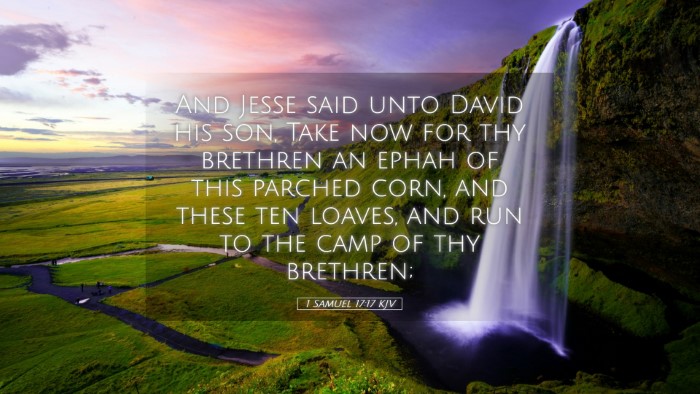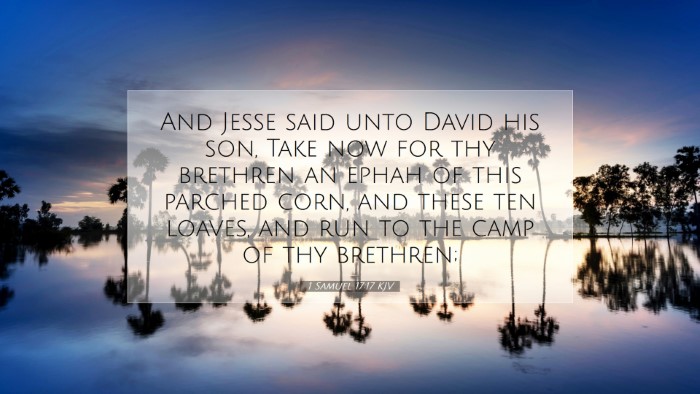Commentary on 1 Samuel 17:17
1 Samuel 17:17 records a pivotal moment in the unfolding narrative of Israel's conflict with the Philistines and sets the stage for the confrontation between David and Goliath. This commentary draws from esteemed public domain scholars, including Matthew Henry, Albert Barnes, and Adam Clarke, to provide a comprehensive examination of the verse.
Text of 1 Samuel 17:17
“And Jesse said unto David his son, Take now for thy brethren an ephah of this parched corn, and these ten loaves, and run to the camp to thy brethren.”
Contextual Background
The context of this verse is critical for understanding its implications. The Israelite army was encamped against the Philistines, who had sent forth their champion, Goliath, to challenge the Israelites. David, the future king, was still a young shepherd at this time, and he was tasked by his father, Jesse, to deliver provisions to his brothers who were enlisted in the army.
Role of Jesse
Jesse’s command to David reveals the role of the family in supporting the war effort. As noted by Matthew Henry, Jesse’s instruction represents a practical and nurturing act, conveying both care for his sons and participation in the collective struggle against a common enemy.
The Significance of Provisions
Albert Barnes highlights the importance of the provisions being delivered. The ephah of parched corn and the ten loaves symbolize sustenance, both physical and spiritual. In the context of warfare, soldiers required nourishment to maintain their strength. This act underscores the notion that even the seemingly mundane tasks contribute to God’s greater plan.
Theological Insights
Beyond mere historical context, this verse invites theological reflection on themes of obedience, preparation, and divine providence.
Obedience
David's willingness to obey his father's request is an early indicator of his character. Adam Clarke posits that obedience to parental authority is foundational, as it prepares individuals for higher callings. David’s adherence to Jesse’s command reflects a heart that is both humble and faithful, traits that God would later elevate in the young shepherd.
Preparation for Future Acts
Henry asserts that this moment serves as a preparatory step for David. Often, God’s greatest plans unfold through ordinary tasks assigned to His people. David’s delivery of provisions is a seemingly insignificant task that directly leads to his profound encounter with Goliath, illustrating that God often prepares His servants in ways that we cannot foresee.
Divine Providence in Mundanity
This chapter showcases the providential hand of God in the mundane details of life. The act of bringing food to his brothers is not just a family obligation—it is part of a divine orchestration that places David in the right place at the right time. As Clarke notes, God’s providence often operates within the realm of daily life, using simple acts to fulfill His larger purposes.
Character of David
David’s character, as illustrated in this verse, highlights qualities that will define his future leadership: faithfulness, courage, and divine purpose. The simple task of delivering food may seem trivial, yet it reveals David’s readiness to serve, even in lowly roles.
Humility and Service
The humility of David’s position as a shepherd and his role as a messenger embodies the servant-hearted leadership that God seeks in His leaders. His service becomes a marked contrast to the fear and inaction observed in the Israelite army, showcasing the spiritual readiness that characterizes true leadership.
Courage and Willingness
The act of running to deliver provisions also suggests a willingness to face potential danger, emphasizing David’s budding courage. In a subsequent verse, David will demonstrate that same courage against Goliath, thus marking his transition from shepherd to king.
Application for Contemporary Readers
This verse carries significant implications for contemporary pastors, students, theologians, and Bible scholars. It teaches us about the integrity of small acts of faithfulness and the readiness to respond to God’s calling in everyday situations.
Lessons on Faithfulness
- Embrace the Mundane: Everyday tasks can serve God's purposes. Whether in ministry or personal life, faithfulness in small things paves the way for greater responsibilities.
- Preparation Matters: God often uses preparation periods to equip us for what lies ahead. Engage in training, learning, and serving where you are.
- Respond to God's Call: Be attentive to the directives God places in your life, even when they seem trivial.
Conclusion
1 Samuel 17:17 encapsulates themes of obedience, preparation, and divine providence through the actions of David and Jesse. This verse not only sets the stage for one of the most famous battles in the Bible but also highlights the profound significance of small acts of service. For pastors, it serves as a reminder to encourage congregations to engage in faithful service in all aspects of life, contending that God is orchestrating a greater plan which often unfolds in the most ordinary circumstances.


